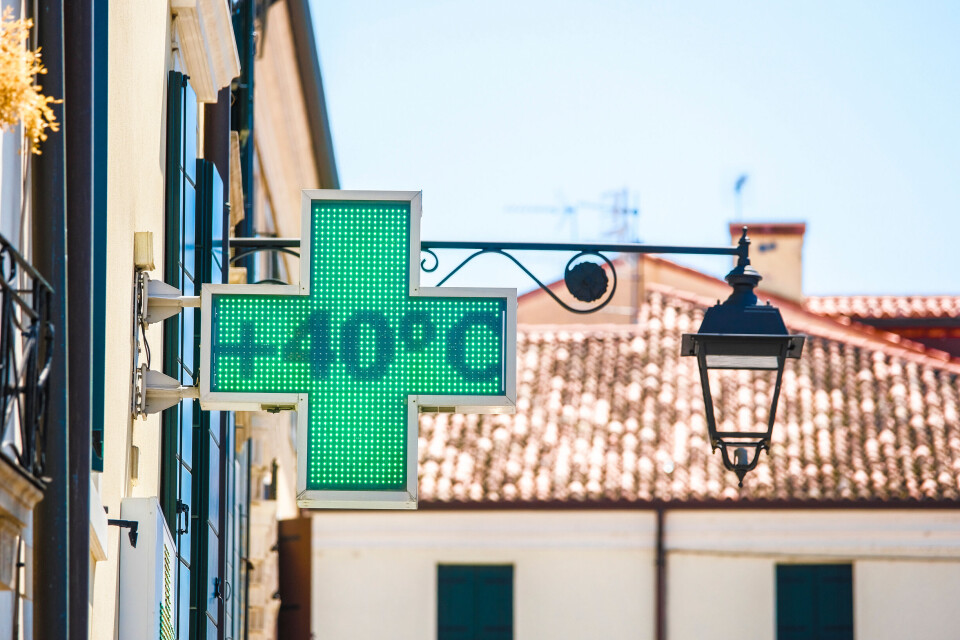-
Many parcel collection points in France are overwhelmed as Christmas approaches
Heavy customer traffic leaves some struggling to cope
-
Warnings issued over connecting to public WiFi networks in France
Lack of encryption and risk of connecting to ‘fake networks’ leave users at risk of hacking attempts
-
Provence’s santon makers seek geographical protection for historic craft
The small, hand-painted clay figurines are at the heart of traditional French Christmas nativity scenes
New study estimates the deadly impact of France’s summer heat
Nearly 33,000 deaths have been linked to summer heat in France since 2014. Two-thirds were people aged over 75

The summer heat has caused nearly 33,000 deaths in France since 2014, according to new estimates.
France’s public health authority Santé publique France (SPF) said high temperatures are thought to have been responsible for between 1,000 to 7,000 deaths per year.
Its report looked at the June 1-September 15 period for every year since 2014. SPF said it is estimated that 32,658 deaths can be attributed to high temperatures over the past nine summers. Of these, 23,000 were aged 75 or over.
The health authority said the situation has worsened due to increased heatwaves and longer and more intense summers.
“We are seeing heatwaves from June onwards when before it was mainly [only] in July and August. Heat has a very fast effect on the body. During periods of high heat, people’s health can worsen quickly and require urgent care.”
SPF defined heatwaves as “extreme climate events” that represent “the highest human burden” in metropolitan France.
Read also: This is how the French government plans to deal with future heatwaves
Adaptation to climate change
As a result of the report’s findings, SPF called for the need to “strengthen the prevention and adaptation to climate change”.
It said: “The results underline the significance of mortality linked to heat since 2014 and the need to reinforce our [societal] adaptation within the context of rapid climate change.
“The impact may correspond to a few days per year, but this can represent up to 9% of summer mortality.”
Depending on the year, this mortality percentage was even higher. The heatwaves of summer 2022 were particularly deadly, the report shows, with an estimated 2,051 deaths, the highest figure over the eight-year period.
Read more: Western France on orange heatwave alert amid highs of 40C
Read more: Heatwave in France: Ten places where records for June have been beaten
SPF said that it would increase its own information about prevention, and behaviour that people should adopt during periods of high heat, to protect more of the population.
This includes the promotion of new practical tips and the spread of more advice as soon as a department tips into an ‘orange’ Météo France ‘canicule (heatwave)’ alert (the second-highest alert, second only to a ‘red’ alert).
SPF will spread extra heat prevention messages through its social media accounts, and also - at the instruction of France’s health ministry - requisition local and national radio and TV stations to send out alerts and health campaigns.
It is also working on measures to help improve protection in schools and in town centres (such as water fountains, heat-absorption vegetation, etc), and for vulnerable, homeless people.
Temperatures below 35C can still be dangerous
The study also shows that people risk dying from heat-related issues even outside of temperature peaks.
Of the 33,000 deaths recorded since 2014, almost two-thirds happened outside of heatwave-related periods, meaning heat from 20C to 35C, SPF said.
The authority said that the highest risk of heat-related death exists among those aged 75 and over (“as expected,” it said), but added that there is still a significant risk affecting people aged under 75.
Read also: How to keep your house cool in the high heat of the French summer
Changes in monitoring health impact
SPF said that from this summer, it will begin to include “an initial estimate of the excess mortality observed during the heatwave episode”, 15 days after a heatwave (a delay necessary to consolidate data).
It said that these results will give an initial indication of the cause of mortality during a heatwave, which will add to “more robust estimates” in its later report published in the autumn.
Advice during heatwaves
SPF said that during extreme temperatures, it recommended that “the entire population modify its behaviour to protect itself”.
It said that higher risks exist for:
-
People who over-expose themselves to high temperatures due to their environment or physical activity
-
People who are unable to reduce their exposure (due to, for example, work or medical reasons)
-
People who have extra risk factors (such as their age, state of health, or taking certain medicines)
Sébastien Denys, director of work and environmental health at SPF, told Ouest France: “When it comes to adapting to climate change, it's more a question of adapting our behaviour rather than banning all physical activity. Because heat peaks are becoming chronic.”
Related articles
Why are sea temperatures off France’s coasts so abnormally high?
























